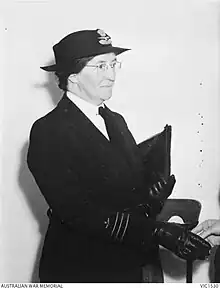Muriel Knox Doherty
Muriel Knox Doherty RRC (19 July 1896 – 29 September 1988) was an Australian nurse who served as a matron in the Royal Australian Air Force Nursing Service during World War II and then as a member of the United Nations Relief and Rehabilitation Administration (UNRRA) in the Bergen-Belsen concentration camp in Germany.
Muriel Knox Doherty | |
|---|---|
 | |
| Born | 19 July 1896 Armadale, Victoria, Australia |
| Died | 29 September 1988 (aged 92) Ryde, New South Wales, Australia |
| Occupation(s) | Nurse and Air Force matron |
Early life and education
Muriel Knox Doherty was born on 19 July 1896 in Armadale, Victoria to Elizabeth Mary (née Meudell) and Robert Knox Doherty. She was educated at home initially and later at Woodstock, a private school in North Sydney.[1]
Career
In 1914, having gained a St John Ambulance First Aid Home Nursing Certificate, she began work at Abbotsleigh School in Wahroonga as a school nurse. Following the outbreak of World War I, she volunteered part-time with the Australian Red Cross Society's No.6 Voluntary Aid Detachment (VAD) from 1915 and then full-time 1917 to 1921.[1]
Her VAD experience led her to undertake nursing training at Royal Prince Alfred Hospital (RPAH) in 1921, where she was awarded the Sir Alfred Roberts Medal for General Nursing Proficiency at her graduation in 1925.[2] She travelled to Europe in 1930 where she gained experience as a private nurse. Back at RPAH she established and led its preliminary training school from 1933 to 1937.[3]
Doherty volunteered for the Australian Army Nursing Service (AANS) in 1935. On the outbreak of WWII, she was appointed sister clerk to the Office of the Principal Matron of the AANS. Keen to serve overseas, she joined the Royal Australian Air Force Nursing Service as 1st squadron leader and matron-in-charge of No. 3 RAAF Hospital at Richmond in 1940 and was promoted wing commander and principal.[4] Doherty was awarded the Royal Red Cross (1st Class) in January 1945 for her work in the RAAF Nursing Service.[5][6]
In May 1945 she was demobilised so that she could go to Europe and work with the UNRRA. She worked in Germany as matron at the Bergen-Belsen concentration camp, following its liberation. The following year she served as adviser on rehabilitation and nursing in Poland.[3][2]
Doherty wrote Caring for the Elderly in 1956 based on her research in Europe.[1]
After living in England for some years, she returned to RPAH where she began to research the hospital's history. The resultant book, The Life and Times of Royal Prince Alfred Hospital, was published posthumously.[1]
Doherty died at West Ryde on 29 September 1988.[1]
Posthumous recognition
Doherty's autobiography, Off the Record, was published posthumously by the New South Wales College of Nursing.[7] James Murray included details of her life and work in his 1997 book, Lifework: heroes of Australian health.[8]
An album of photographs by Doherty was included in the Treasures of the Great Libraries exhibition held at the National Library of Australia in 2002.[9] Her papers are held in the State Library of New South Wales.[10]
Diane Armstrong based a character in her novel, Nocturne, on Doherty.[11]
Works
- Doherty, M. K.; Sirl, M. B.; Ring, O. I. (1944), Modern practical nursing procedures, Dymocks Book Arcade
- Doherty, M. K. (1956), Caring for the elderly, Dymocks Book Arcade
- Doherty, M. K. (1996), Russell, Lynette R (ed.), The life and times of Royal Prince Alfred Hospital, Sydney, Australia, New South Wales College of Nursing, ISBN 978-0-909543-66-2
- Doherty, M. K. (1996), Russell, R. Lynette (ed.), Off the record – the life and times of Muriel Knox Doherty 1896–1988 : an autobiography, New South Wales College of Nursing, ISBN 978-0-909543-67-9
- Doherty, M. K. (2000), Cornell, J. A.; Russell, R. Lynette (eds.), Letters from Belsen 1945 : an Australian nurse's experiences with the survivors of war, Allen & Unwin, ISBN 978-1-86508-222-6
References
- Russell, R. Lynette, "Doherty, Muriel Knox (1896–1988)", Australian Dictionary of Biography, Canberra: National Centre of Biography, Australian National University, retrieved 2 June 2023
- "Doherty, Muriel Knox". Encyclopedia of Australian Science and Innovation. Retrieved 2 June 2023.
- "Doherty, Muriel Knox". Bright Sparcs Biographical entry. Retrieved 2 June 2023.
- R L Russell (1 July 1999). "Muriel Knox Doherty--her story". Collegian. 6 (3): 35–38. doi:10.1016/S1322-7696(08)60340-6. ISSN 1322-7696. PMID 10846997. Wikidata Q50243493.
- "Matron Muriel Knox Doherty". Australian Honours Search Facility. Retrieved 2 June 2023.
- "Faith, Hope, Charity – Australian Women and Imperial Honours – Browse Alpha – D". Women Australia. Retrieved 2 June 2023.
- Doherty, M. K. (1996), Russell, R. Lynette (ed.), Off the record – the life and times of Muriel Knox Doherty 1896–1988 : an autobiography, New South Wales College of Nursing, ISBN 978-0-909543-67-9
- Murray, James (1997), Lifework : heroes of Australian health, Focus Publishing for Medical Benefits Fund of Australia Ltd., ISBN 978-1-875359-35-6, retrieved 2 June 2023
- Linda Shields (1 April 2002). "Muriel Knox Doherty--recognised at the 'Treasures' exhibition in Canberra". Collegian. 9 (2): 8. doi:10.1016/S1322-7696(08)60409-6. ISSN 1322-7696. PMID 12054397. Wikidata Q48721183.
- Doherty, Muriel Knox (1960), Muriel Knox Doherty papers, 1923–1960s, retrieved 2 June 2023
- Landsman, Lexl (2 May 2008). "A gripping story of survival". The Australian Jewish News. Vol. 115, no. 33. New South Wales, Australia. p. 10 (Life). Retrieved 2 June 2023 – via National Library of Australia.